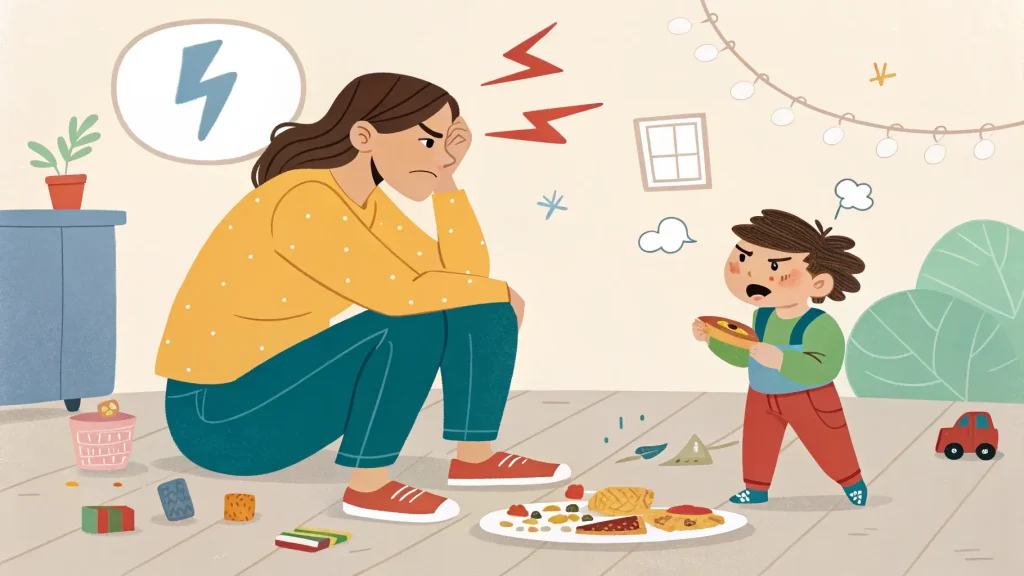I remember the day I realized I might be what experts call a “permissive parent.” My four-year-old daughter was having ice cream for breakfast, and instead of putting my foot down, I found myself negotiating with her about how many sprinkles were acceptable before 9 AM.
That moment sparked a journey of self-reflection that changed how I approach parenting – and I’m here to share everything I’ve learned along the way.
What Is Permissive Parenting, Really?
You know those parents at the playground who rarely say “no” to their kids? The ones who seem more like friends than authority figures? That’s often what people think of when they hear “permissive parenting.”
But as someone who’s been there, I can tell you it’s more complex than that.
Permissive parenting typically involves:
- High responsiveness but low demands
- Few rules and inconsistent enforcement
- Warm and nurturing relationships
- Reluctance to disappoint or upset children
- Limited structure and guidance
The Good, The Bad, and The Reality Check
Let me be honest with you – being a permissive parent wasn’t entirely a conscious choice for me. Like many of us, I fell into this style because I wanted to be different from my own strict upbringing.
I wanted my kids to feel heard, understood, and supported in ways I hadn’t.
The Unexpected Benefits I’ve Discovered
Despite what some parenting experts might warn, it hasn’t been all chaos and entitled kids. Through my permissive parenting journey, I’ve noticed some surprising positives:
Strong Emotional Intelligence
My kids aren’t afraid to express their feelings. When my son is upset, he doesn’t bottle it up – he comes to me and says, “Mom, I’m feeling really frustrated right now.” That emotional awareness? It’s pure gold.
Creative Problem-Solving
Without rigid rules controlling their every move, my children have developed impressive problem-solving skills. Just last week, my daughter figured out how to build a stable fort using unconventional materials because I let her experiment rather than directing her.
Close Parent-Child Relationships
The trust and openness we’ve built are incredible. My kids tell me everything – sometimes more than I want to know! But I’ll take too much information over secrets any day.
The Challenges Nobody Talks About

Let’s get real for a minute. Permissive parenting isn’t all rainbow-colored conversations and peaceful negotiations. Here are some struggles I’ve faced:
Consistency Is Hard
When you’re trying to be understanding all the time, it’s challenging to maintain boundaries. I’ve had to learn that being permissive doesn’t mean being a pushover.
Social Judgment
Other parents sometimes give me the side-eye when I let my kids make their own choices about clothes or food. I’ve learned to trust my instincts while remaining open to feedback.
The Balance Act
Finding the sweet spot between freedom and guidance is an ongoing challenge. Sometimes I lie awake at night wondering if I should have been firmer about bedtime or more relaxed about screen time.
Making Permissive Parenting Work: Practical Tips
After years of trial and error, here’s what I’ve found actually works:
Set Clear (But Flexible) Guidelines
Instead of rigid rules, we have family guidelines. For example, instead of “No TV after 8 PM,” we discuss what makes a good bedtime routine and why sleep matters.
Natural Consequences
When my son refused to wear a jacket despite my suggestions, I packed one in his backpack anyway. He felt cold at recess, learned from the experience, and now makes better choices about weather-appropriate clothing.
Emotional Coaching
We talk about feelings – a lot. When tantrums happen (and they do), we explore the emotions behind them rather than just enforcing discipline.
The Evolution of My Approach
Over time, I’ve developed what I call “mindful permissiveness.” It’s about being present and intentional while maintaining that nurturing, supportive environment. Here’s what it looks like:
Morning Routines
Instead of strict schedules, we have flexible morning flows. My kids know what needs to happen before school (teeth brushed, dressed, breakfast eaten), but they have autonomy in how and when they complete these tasks.
Homework Approach
Rather than enforcing strict study times, we discuss when they feel most focused and create personalized study schedules together.
Mealtime Philosophy
While I ensure healthy options are available, I’ve learned to trust my kids’ intuition about hunger and food choices. Yes, sometimes this means breakfast for dinner!
Finding Your Balance
Remember, you don’t have to choose between being permissive and authoritative – you can create your own unique blend. Here’s how:
Listen to Your Instincts
You know your children better than any parenting expert. Trust your gut while staying informed about child development.
Adapt as Needed
What works for your toddler might not work for your teenager. Be ready to evolve your approach as your children grow.
Maintain Self-Care
Permissive parenting can be emotionally demanding. Make sure to recharge your own batteries regularly.
Looking Ahead: The Long-Term Impact
While my kids are still young, I’m starting to see the fruits of this parenting style. They’re developing into confident, emotionally intelligent individuals who aren’t afraid to think for themselves or come to me with problems.
Building Future Leaders
By allowing my children to make age-appropriate decisions, I’m helping them develop crucial leadership skills early on.
Fostering Independence
The freedom to make choices (and mistakes) has helped my kids become surprisingly self-reliant.
A Final Note from One Parent to Another
Parenting isn’t about perfection – it’s about connection. Whether you’re naturally permissive or just curious about this approach, remember that the goal is raising healthy, happy humans who feel secure in your love.
Remember what Maya Angelou said: “Do the best you can until you know better. Then when you know better, do better.” Your parenting style will evolve, and that’s exactly as it should be.
Want to start incorporating elements of permissive parenting into your approach? Start small. Pick one area where you can offer more choices or be more flexible.
Watch how your child responds, adjust accordingly, and most importantly, be patient with yourself as you learn and grow alongside your children.
After all, isn’t that what parenting is really about?


